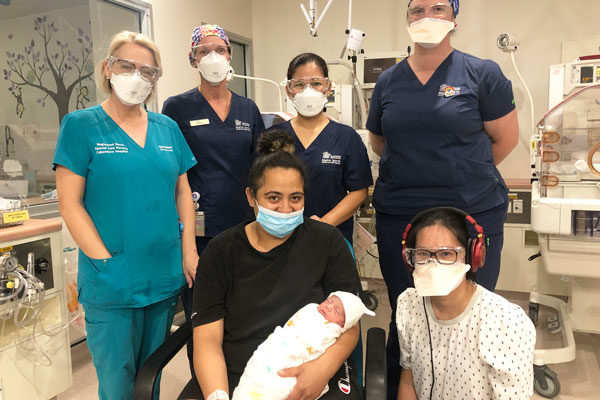
Researcher Thuy Frakking with new mum Jessie and son Nehemiah, surrounded by Special Care Nursery midwives and nurses Alicia Blake, Michelle Guay, Michelle Thomas and Acting Midwifery Unit Manager Stephanie Webster at Caboolture Hospital.
First time mum, Jessie, had ‘a moment’ when she heard her premature baby, Nehemiah, breastfeed by listening to his swallowing sounds via headphones at Caboolture Hospital recently.
Jessie was participating in the Swallowing Sounds in Premature Babies (SUPERB) study, a multi-centre trial in special care nurseries across Caboolture Hospital, Royal Brisbane and Women’s Hospital (RBWH) and Gold Coast University Hospital.
The SUPERB study records swallowing sounds from premature babies with and without swallowing problems. Caregivers can listen to their babies’ swallowing sounds as their baby feeds from the breast or bottle.
The sounds collected are being used to determine what is considered normal and abnormal swallowing sounds in premature babies. Having such information will help guide health professionals on what they should be listening for in detecting swallowing difficulties.
Caboolture Hospital Research Coordinator Dr Thuy Frakking said premature babies could experience swallowing difficulties when learning to feed from either the breast or bottle.
“Swallowing difficulties can lead to fluid entering the airways (aspiration) and increase the risks of damage to developing lungs,” Dr Frakking said.
“Premature babies with swallowing difficulties can experience longer hospital admissions, take longer to transition to full oral feeding and/or go home on tube feeding.
“The accurate assessment of swallowing difficulties is important in preventing damage to the developing lung and informing tailored feeding management plans in premature babies.”
Jessie appreciated the research trial was about ‘real-life stuff’ and encouraged other mothers to share outcomes and be confident they could participate as well.
“Through the headphones, I was able to hear and know that I am able to provide for my child,” Jessie said.
This study is being funded by a Clinician Research Fellowship (Metro North Hospital and Health Service) and Children’s Hospital Foundation Early Career Project Grant.